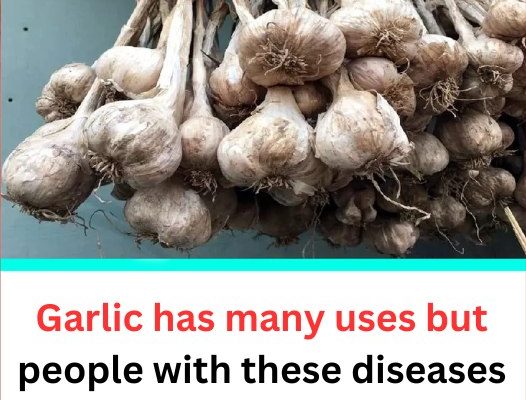Garlic is widely praised for its health benefits, including its ability to boost the immune system, reduce inflammation, and even lower blood pressure. However, there are certain conditions in which garlic consumption should be limited or avoided entirely. Here are some conditions where people should avoid eating garlic:
1. Gastroesophageal Reflux Disease (GERD) Why to avoid garlic: Garlic, particularly raw garlic, can irritate the esophagus and increase the production of stomach acid, leading to acid reflux. This can cause heartburn, chest pain, and discomfort, which are common symptoms of GERD.
What to watch out for: If you suffer from GERD, it’s best to avoid raw garlic or consume it in small, cooked portions to reduce the risk of triggering symptoms.
2. Blood Disorders (Including Bleeding Disorders) Why to avoid garlic: Garlic has natural anticoagulant properties, meaning it can thin the blood. While this can be beneficial in preventing blood clots, it can pose a danger to individuals with bleeding disorders (like hemophilia) or those on blood-thinning medications such as warfarin or aspirin.
What to watch out for: If you have a bleeding disorder or are taking medication to thin your blood, consult your doctor before consuming large amounts of garlic to avoid excessive bleeding or bruising.
3. Low Blood Pressure (Hypotension) Why to avoid garlic: Garlic can naturally lower blood pressure, which is great for people with high blood pressure, but can be problematic for those with already low blood pressure. Excessive garlic intake may cause dizziness, lightheadedness, or fainting due to a further drop in blood pressure.
What to watch out for: If you have hypotension (low blood pressure), it’s important to monitor your garlic intake and discuss it with your healthcare provider.
4. Allergies to Garlic Why to avoid garlic: Some people are allergic to garlic, which can lead to symptoms like skin rashes, itching, swelling, or digestive problems. In severe cases, it could cause difficulty breathing or anaphylaxis.
What to watch out for: If you experience any allergic reactions after consuming garlic, such as hives, shortness of breath, or swelling, seek medical attention immediately and avoid garlic altogether.
5. Pregnancy (In Excess) Why to avoid garlic: While garlic in moderate amounts is generally considered safe during pregnancy and may even provide some health benefits, consuming large quantities (especially raw garlic) can stimulate uterine contractions, which could potentially lead to complications or preterm labor.
What to watch out for: Pregnant women should consume garlic in moderation and avoid excessive amounts or concentrated garlic supplements. Always consult with a healthcare provider if you’re considering taking garlic supplements during pregnancy.
6. Stomach Ulcers or Irritable Bowel Syndrome (IBS) Why to avoid garlic: Garlic can be harsh on the digestive system, especially when consumed raw, and may irritate conditions like stomach ulcers or IBS. It can cause bloating, gas, and abdominal discomfort, which are already common symptoms of these digestive conditions.
What to watch out for: If you have stomach ulcers or IBS, it’s recommended to avoid raw garlic and limit your intake of garlic in general. Cooked garlic may be easier to tolerate.
7. Liver Disease (Cirrhosis) Why to avoid garlic: In people with cirrhosis or severe liver disease, garlic may exacerbate certain symptoms due to its ability to stimulate bile production, which can strain the liver further.
What to watch out for: If you have liver disease, it’s important to check with your doctor before consuming garlic in large amounts, as it may interact with your condition. General Tips for Safe Garlic Consumption:
Cook garlic: Cooking garlic reduces its intensity and may make it easier to tolerate, especially for people with digestive conditions.
Consult your doctor: If you have any of the above conditions or are taking medications, it’s always a good idea to consult with a healthcare provider before making significant changes to your diet, especially when incorporating garlic in large amounts or as a supplement.
Garlic is a powerful food with many health benefits, but it’s important to be mindful of how it may affect your health, particularly if you have any of the conditions mentioned above. Always listen to your body and consult a healthcare professional if you’re unsure about its impact on your health.



